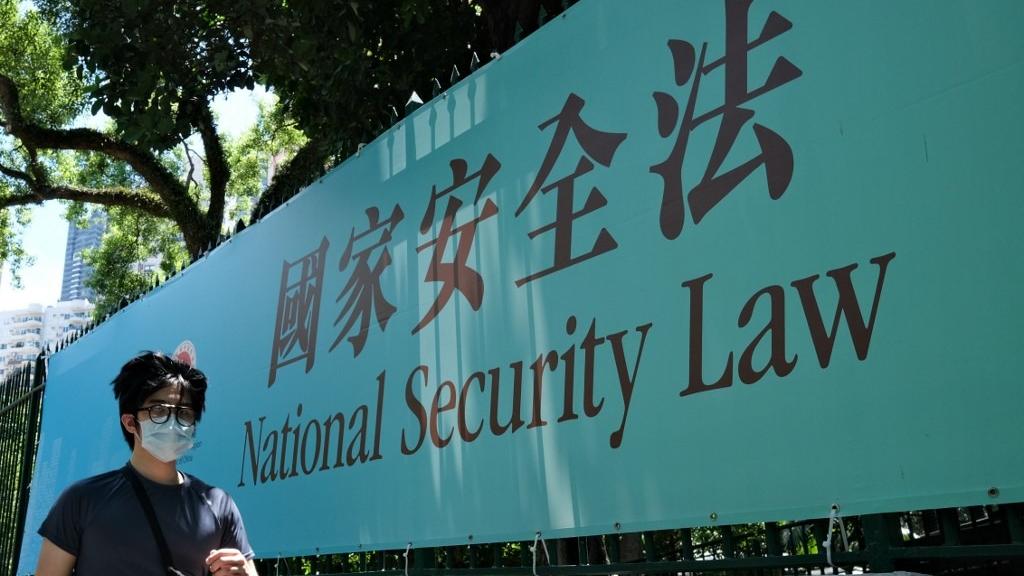 A man walks past a government public notice banner for the National Security Law in Hong Kong on July 15, 2020. (ANTHONY WALLACE / AFP)
A man walks past a government public notice banner for the National Security Law in Hong Kong on July 15, 2020. (ANTHONY WALLACE / AFP)
BEIJING - The Standing Committee of the National People's Congress (NPC) on Friday adopted an interpretation of Article 14 and Article 47 of the Law of the People's Republic of China on Safeguarding National Security in the Hong Kong Special Administrative Region.
The interpretation was adopted at the 38th session of the 13th NPC. Lawmakers at the session deliberated a State Council proposal for giving the interpretation. The proposal was submitted to respond to a report by the HKSAR Chief Executive to the central government.
Answering media questions on the interpretation, a leading official of the Legislative Affairs Commission of the NPC Standing Committee said that there is a major disagreement in the Hong Kong society over whether foreign lawyers without local full qualifications can handle national security cases, and how the Hong Kong national security law is applied under such circumstances
Answering media questions on the interpretation, a leading official of the Legislative Affairs Commission of the NPC Standing Committee said that there is a major disagreement in the Hong Kong society over whether foreign lawyers without local full qualifications can handle national security cases, and how the Hong Kong national security law is applied under such circumstances.
It is necessary and viable to give an interpretation of related provisions in the Hong Kong national security law, clarify their meanings, and define the means of and paths to solving related questions, said the official.
ALSO READ: CE vows to implement NPCSC interpretation
Further clarifying Article 14 of the Hong Kong national security law, the interpretation says that, the Committee for Safeguarding National Security of the HKSAR assumes the statutory duties for safeguarding national security in the HKSAR, and has the power to make judgements and decisions on whether national security is involved. Information relating to the work of the Committee shall not be subject to disclosure.
Decisions made by the Committee shall not be amenable to judicial review, and shall have enforceable legal force, according to the interpretation.
No administrative, legislative or judicial institution, organization, or individual in the HKSAR shall interfere with the work of the Committee. The decisions of the Committee shall be respected and enforced, according to the interpretation.
ALSO READ: NPCSC starts to interpret Hong Kong’s NSL
Further clarifying Article 47, the interpretation says that, the courts of the HKSAR, when facing such questions in the adjudication of a case concerning offense endangering national security, as whether an act involves national security or whether the relevant evidence involves State secrets, shall request and obtain a certificate from the Chief Executive to certify the questions. The certificate shall be binding on the courts, according to the interpretation.
According to the interpretation, questions of whether foreign lawyers without local full qualifications in the HKSAR can serve as defense counsel or legal representative in cases concerning offense endangering national security belong to questions stipulated in Article 47, and shall obtain a certificate from the Chief Executive.
If the courts of the HKSAR fail to request and obtain a certificate from the Chief Executive to certify the questions, the Committee for Safeguarding National Security of the HKSAR shall, in accordance with Article 14, perform its statutory duties to make related judgements and decisions on the circumstances and questions, according to the interpretation.
The interpretation has the same effect with the Hong Kong national security law, said the official of the Legislative Affairs Commission, adding that the interpretation is retroactive to the date of the law's enactment.
READ MORE: High Court further postpones Lai trial to Sept 2023
The NPC Standing Committee interpretation will help resolve major disputes in enforcing the Hong Kong national security law, and will have positive effects on Hong Kong residents' lawful and proper exercise of the right to the choice of lawyers, as well as on the HKSAR's lawful and proper exercise of its independent judicial power, including that of final adjudication, said the official.
It will not undermine the HKSAR's high degree of autonomy, the official added.


